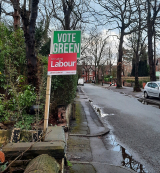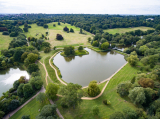
Brussels, August 7th 2009
One year after the August War, the Georgian agression under leadership of President Mikhail Saakashvili in the beginning of August 2008 against the South Ossetian people, it is clear that what happened cannot be forgotten. In memory of the victims a round table conference was held in four cities: Tskhinvali, where the largest battle of the war was, Moscow, Vladikavkaz, the capital city of the Republic of North-Ossetia and Brussels, the European capital. After a minute of silence the conference in Brussels started with an attempt to reconstruct what really happened in August 2008 around Tskhinvali. During the night of August 7 to 8 August 2008, Georgia launched a large-scale military attack against the self-proclaimed Republic of South Ossetia to assert Georgian governance of the Region. The following day, Russia reacted by deploying combat troops in South Ossetia but also in the nearby breakaway republic of Abkhazia and launching bombing raids into Georgia. Russian and Ossetian troops clashed with Georgians in a three-day Battle where many victims mostly innocent South Ossetian civilians fell. Russian naval forces blocked Georgia's coast and landed ground forces and paratroopers on the Georgian cost. On August 9th 2008 Russian and Abkhazian forces opened a second front by attacking the Kodori Gorge, held by Georgia and entered western parts of Georgia's interior. After five days of heavy fighting, the Georgian forces were ejected from South Ossetia and Abkhazia. Russian troops entered Georgia proper, occupying the cities Poti and Gori among others. After mediation by the French presidency of the European Union, the parties reached a preliminary ceasefire agreement but fighting did not stop immediately. After the signing of the ceasefire Russia pulled most of its troops out of Georgia proper. However, buffer zones were established around Abkhazia and South Ossetia and Russia created points in Georgia's interior (like Poti, Senaki, Perevi). On August 26th 2008 Russia recognised the independance of South Ossetia and Abkhazia. Russia completed its withdrawal from Georgia proper in the beginning of October 2008 but until now Russian troops remain stationed in Abkhazia and South Ossetia as well as in areas under Georgian control before the war. But it is clear that even after the war ended the tensions between the belligerents remain high. The round table conference in Brussels stated that if you want to understand this war and the conflict between Georgians and Ossetians you have to go back to the origins of the conflict which can be found in the 18th century and which are perfectly described in the book of Oleg Kudukhov and Ruslan Bzarov "The South Ossetia - The Five Days in August" It says that Ossetians have always been independant and that Georgia is the agressor. The same conclusion came out on Friday August 7th 2009 in Brussels where most of the present people agreed that South Ossetia had a legal basis to become independant although a little remark was made by a Finnish correspondent who said that the European people had to be aware when they make an evaluation of the situation in that region and judge without prejudices The day ended in Brussels with watching the film "August Tskhinvali" from author Akim Salbiev. It is a documentary about the first days of last August 2009, the painful sight of a city after war and destruction seen through the eyes of a local eleven years old child.
Maryan Mahieu
One year after the August War, the Georgian agression under leadership of President Mikhail Saakashvili in the beginning of August 2008 against the South Ossetian people, it is clear that what happened cannot be forgotten. In memory of the victims a round table conference was held in four cities: Tskhinvali, where the largest battle of the war was, Moscow, Vladikavkaz, the capital city of the Republic of North-Ossetia and Brussels, the European capital. After a minute of silence the conference in Brussels started with an attempt to reconstruct what really happened in August 2008 around Tskhinvali. During the night of August 7 to 8 August 2008, Georgia launched a large-scale military attack against the self-proclaimed Republic of South Ossetia to assert Georgian governance of the Region. The following day, Russia reacted by deploying combat troops in South Ossetia but also in the nearby breakaway republic of Abkhazia and launching bombing raids into Georgia. Russian and Ossetian troops clashed with Georgians in a three-day Battle where many victims mostly innocent South Ossetian civilians fell. Russian naval forces blocked Georgia's coast and landed ground forces and paratroopers on the Georgian cost. On August 9th 2008 Russian and Abkhazian forces opened a second front by attacking the Kodori Gorge, held by Georgia and entered western parts of Georgia's interior. After five days of heavy fighting, the Georgian forces were ejected from South Ossetia and Abkhazia. Russian troops entered Georgia proper, occupying the cities Poti and Gori among others. After mediation by the French presidency of the European Union, the parties reached a preliminary ceasefire agreement but fighting did not stop immediately. After the signing of the ceasefire Russia pulled most of its troops out of Georgia proper. However, buffer zones were established around Abkhazia and South Ossetia and Russia created points in Georgia's interior (like Poti, Senaki, Perevi). On August 26th 2008 Russia recognised the independance of South Ossetia and Abkhazia. Russia completed its withdrawal from Georgia proper in the beginning of October 2008 but until now Russian troops remain stationed in Abkhazia and South Ossetia as well as in areas under Georgian control before the war. But it is clear that even after the war ended the tensions between the belligerents remain high. The round table conference in Brussels stated that if you want to understand this war and the conflict between Georgians and Ossetians you have to go back to the origins of the conflict which can be found in the 18th century and which are perfectly described in the book of Oleg Kudukhov and Ruslan Bzarov "The South Ossetia - The Five Days in August" It says that Ossetians have always been independant and that Georgia is the agressor. The same conclusion came out on Friday August 7th 2009 in Brussels where most of the present people agreed that South Ossetia had a legal basis to become independant although a little remark was made by a Finnish correspondent who said that the European people had to be aware when they make an evaluation of the situation in that region and judge without prejudices The day ended in Brussels with watching the film "August Tskhinvali" from author Akim Salbiev. It is a documentary about the first days of last August 2009, the painful sight of a city after war and destruction seen through the eyes of a local eleven years old child.
Maryan Mahieu








































